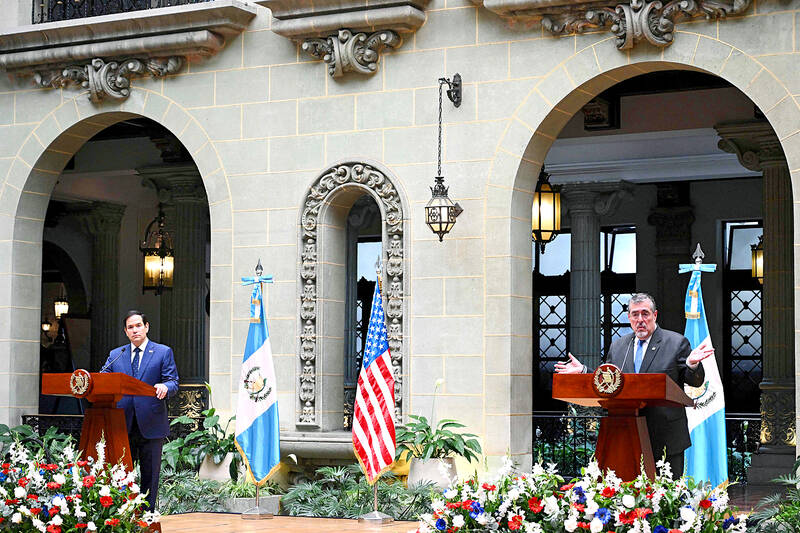Guatemalan President Bernardo Arevalo met with US Secretary of State Marco Rubio in Guatemala City on Wednesday where they signed a deal for Guatemala to accept migrants deported from the US, while Rubio commended Guatemala for its support for Taiwan and said the US would do all it can to facilitate greater Taiwanese investment in Guatemala.
Under the migrant agreement announced by Arevalo, the deportees would be returned to their home countries at US expense. It is the second deportation deal that Rubio has reached during a Central America trip that has been focused mainly on immigration.
Arevalo said his country — a major source of migration — would accept both “returning nationals, and foreigners” who would be sent on to their respective countries.

Photo: AFP
The approach is a stark contrast to Colombia, whose leftist leader demanded “dignified” treatment for deportees and sent planes to repatriate migrants after refusing US military flights with shackled people on board — sparking a brief tariff tussle with Trump.
Arevalo, who has been undermined by an elite that has connections to US conservatives, promised to allow a 40 percent increase in flights repatriating Guatemalans and others from third countries, addressing a key priority for US President Donald Trump.
“We’re not just neighbors. We’re allies — we’re friends — and I think that will be evidenced by the work that we’ve done here,” Rubio told a joint news conference with Arevalo.
He also said the US Army Corps of Engineers would visit Guatemala to help develop plans for a more modern port.
Rubio and Arevalo said they also discussed the value of democracy over a dinner on Tuesday in Guatemala City’s old town.
“I would like to commend you for your commitment to democracy and to institutions,” Rubio said.
Rubio, a longtime hawk on China, said the US would “do all we can to facilitate more Taiwanese investment in the economy of Guatemala.”
“We thank you very much for your support and the relationship that you already have with Taiwan, another democracy,” he said.
“It’s not easy in a world where there is a lot of pressure to change that recognition and to break those ties, but you have always stood firm, and we look for opportunities for that only — not only to be a diplomatic relationship, but for it also to be an economic relationship with investments and opportunities,” he added.
In Taipei yesterday, President William Lai (賴清德) on X expressed gratitude to Arevalo and Rubio for their support for Taiwan.
“Sincere thanks to President Bernardo Arevalo & Secretary of tate Marco Rubio for expressing firm support for the relationship shared by #Taiwan, #Guatemala, & the #US. Our continued joint efforts to bolster trade & investment pave the way for greater prosperity and stronger economic ties,” he wrote.

INVESTIGATION: The case is the latest instance of a DPP figure being implicated in an espionage network accused of allegedly leaking information to Chinese intelligence Democratic Progressive Party (DPP) member Ho Jen-chieh (何仁傑) was detained and held incommunicado yesterday on suspicion of spying for China during his tenure as assistant to then-minister of foreign affairs Joseph Wu (吳釗燮). The Taipei District Prosecutors’ Office said Ho was implicated during its investigation into alleged spying activities by former Presidential Office consultant Wu Shang-yu (吳尚雨). Prosecutors said there is reason to believe Ho breached the National Security Act (國家安全法) by leaking classified Ministry of Foreign Affairs information to Chinese intelligence. Following interrogation, prosecutors petitioned the Taipei District Court to detain Ho, citing concerns over potential collusion or tampering of evidence. The

TRADE: The premier pledged safeguards on ‘Made in Taiwan’ labeling, anti-dumping measures and stricter export controls to strengthen its position in trade talks Products labeled “made in Taiwan” must be genuinely made in Taiwan, Premier Cho Jung-tai (卓榮泰) said yesterday, vowing to enforce strict safeguards against “origin laundering” and initiate anti-dumping investigations to prevent China dumping its products in Taiwan. Cho made the remarks in a discussion session with representatives from industries in Kaohsiung. In response to the US government’s recent announcement of “reciprocal” tariffs on its trading partners, President William Lai (賴清德) and Cho last week began a series of consultations with industry leaders nationwide to gather feedback and address concerns. Taiwanese and US officials held a videoconference on Friday evening to discuss the

NEGOTIATIONS: The US response to the countermeasures and plans Taiwan presented has been positive, including boosting procurement and investment, the president said Taiwan is included in the first group for trade negotiations with the US, President William Lai (賴清德) said yesterday, as he seeks to shield Taiwanese exporters from a 32 percent tariff. In Washington, US Trade Representative Jamieson Greer said in an interview on Fox News on Thursday that he would speak to his Taiwanese and Israeli counterparts yesterday about tariffs after holding a long discussion with the Vietnamese earlier. US President Donald Trump on Wednesday postponed punishing levies on multiple trade partners, including Taiwan, for three months after trillions of US dollars were wiped off global markets. He has maintained a 10 percent

PERSONAL DATA: The implicated KMT members allegedly compiled their petitions by copying names from party lists without the consent of the people concerned Judicial authorities searched six locations yesterday and questioned six people, including one elderly Chinese Nationalist Party (KMT) member and five KMT Youth League associates, about alleged signature forgery and fraud relating to their recall efforts against two Democratic Progressive Party (DPP) legislators. After launching a probe into alleged signature forgery and related fraud in the KMT’s recall effort, prosecutors received a number of complaints, including about one petition that had 1,748 signatures of voters whose family members said they had already passed away, and also voters who said they did not approve the use of their name, Taipei Deputy Chief Prosecutor